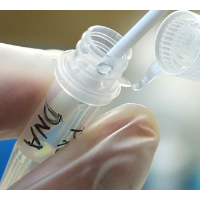State Appeals Court Whacks California DNA Collection Law that Feds OK’d

Back in March, Courthouse News Service pronounced the appeal of California’s DNA law “finally kaput” when the U.S. Ninth Circuit Court of Appeals unanimously kicked the case back to a District Court along with one concurring judge’s admonition, “This case is over and the District Court has no obligation to give the plaintiffs an opportunity to amend their complaint.”
On Wednesday, a three-judge panel of the California First District Court of Appeal unanimously decided otherwise.
The judges ruled that a state policy―authorized by voter passage of Proposition 69 in 2004 and effective as of 2009―violated the California Constitution when it allowed authorities to collect and store in a database DNA information taken from people arrested for a felony, but not yet charged.
“The California DNA Act intrudes too quickly and too deeply into the privacy interests of arrestees,” Presiding Justice J. Anthony Kline wrote. “The fact that DNA is collected and analyzed immediately after arrest means that some of the arrestees subjected to collection will never be charged, much less convicted, of any crime.”
That’s pretty much what happened in 2012. The court cited data that 62% of people arrested in California on suspicion of a felony were never convicted of a crime. Around 20% weren’t even charged.
The case will almost certainly land in the California Supreme Court. Meanwhile, the U.S. District Court has ordered a stay of its competing ruling pending resolution of state law.
The Ninth Circuit said the matter was settled by the U.S. Supreme Court in Maryland v. King last year and there was no substantial difference between the two cases. The ACLU disagreed, arguing that the Maryland law applies only to those charged with serious felonies and swabbing has to be approved by a judge. The sample is automatically destroyed if there is no conviction.
In California, the felony can be alleged and not charged, it need not be serious and a judge’s approval is not necessary. The sample is not automatically destroyed and won’t be until the detainee formally asks and receives approval.
Justice Kline wrote that approval is not easily obtained:
“The expungement process is neither quick nor guaranteed. . . . California places the burden on the arrestee to pursue an onerous judicial process which seemingly vests the prosecutor with power to prevent expungement merely by objecting to the request.”
Maryland v. King asserted that DNA was no different than fingerprints, it could be obtained during booking and there was already plenty of case law that applied. Opponents of that reasoning argue that DNA sampling is not just a technological progression from fingerprinting; DNA are genetic blueprints that hold far more data and can be used, and misused, in myriad ways that fingerprints can’t.
According to the Federal Bureau of Investigation (FBI), California’s DNA database has more than 1.4 million offenders on record and 496,872 arrestees, and is growing at the rate of 11,000 samples a month, thanks in large part to arrestee submissions.
Data is shared with local and federal authorities, including the FBI, which operates the Combined DNA Index System (CODIS). The federal database contains 9.81 million offenders and 1.18 million arrestees, and is growing at an accelerating rate. It is often featured in popular television crime shows, including Law & Order, Criminal Minds, CSI, Bones, Numb3rs and Dexter.
California Attorney General Kamala Harris and her office have defended the state law in court.
–Ken Broder
To Learn More:
California Court Strikes Down DNA Collection Law (by Sudhin Thanawala, Associated Press)
Mandatory DNA Collection During Arrest Is Unconstitutional, Court Says (by Maura Dolan, Los Angeles Times)
Federal Appeals Court Lets State Collect DNA in Felony Arrests (by Ken Broder, AllGov California)
Haskell v. Harris (American Civil Liberties Union of Northern California)
- Top Stories
- Controversies
- Where is the Money Going?
- California and the Nation
- Appointments and Resignations
- Unusual News
- Latest News
- California Forbids U.S. Immigration Agents from Pretending to be Police
- California Lawmakers Urged to Strip “Self-Dealing” Tax Board of Its Duties
- Big Oil’s Grip on California
- Santa Cruz Police See Homeland Security Betrayal in Use of Gang Roundup as Cover for Immigration Raid
- Oil Companies Face Deadline to Stop Polluting California Groundwater





